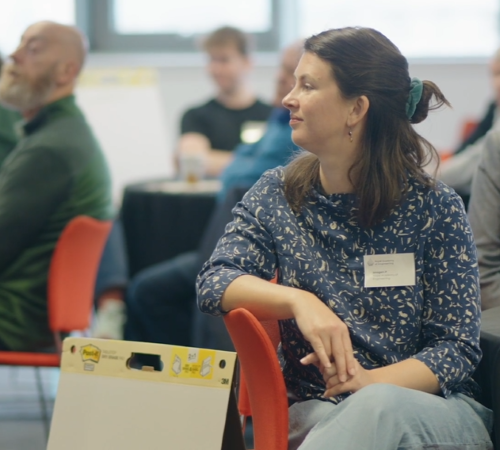
Event overview
The Academy's 2nd People's AI Stewardship Summit was held in Glasgow on the 9th October 2024 in partnership with the Enterprise Hub Scotland.
Members of the public from the local area in and around Glasgow were invited to share their hopes and fears alongside experts and local stakeholders: exploring and reflecting on the future of AI in Scotland.
This summit focused on exploring the themes of AI in healthcare and education. With dedicated sector-specific discussions during the poster sessions.
Sessions
AI vs Cars: Professor Michael Rovatsos
Society never, in any final way, decides whether technology is good or bad. We decide whether to have it or not.
Key note speaker: Professor Michael Rovatsos, University of Edinburgh
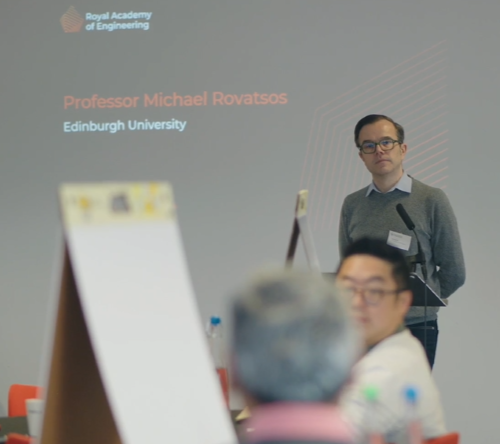
Professor Rovatsos is a Professor of Artificial Intelligence at the School of Informatics, part of the Artificial Intelligence and its Applications Institute (AIAI).
Professor Rovatsos set the scene by drawinga parallel between the well-established stewardship of cars and the relatively nascent challenges of managing AI. Society understands cars—there are institutions, regulations, and social norms around their use.
Michael’s key question was: “What does effective AI stewardship look like?”
In response to Michael’s talk, participants reflected on what
distinguishes AI from traditional technologies like cars, emphasising that AI’s inherent scalability presents challenges due to its potential to affect increasing numbers of people at an unprecedented pace.
Poster presentations: Exploring hopes, fears, and uncertainties surrounding AI
The next portion of the day asked the participants to share their personal hopes and fears for AI in different settings, and to create posters to share their collective visions for AI in Glasgow. This summit had particular focus on the role of AI in healthcare and education. Explore the themes below.
Initial perspectives on AI
Hopes
Many expressed great optimism about AI’s innovative potential, envisioning applications ranging from handy tools for improved job searching to enhanced disaster mitigation. Increased efficiency in delivering services and completing specific tasks was a recurring theme, with participants excited about AI freeing resources and time for people to explore creative pursuits.
Participants hope for more transparency, perhaps in the form of direct labelling and watermarking of AI-generated content.
Participants acknowledged the current dominance of certain cultures and entities in the field and emphasised the need for equitable benefits for all: “I hope bottom line doesn’t trump value”.
less admin, more creativity
I hope systems are upfront about the fact they use AI
Fears
While a couple of participants mentioned extreme, dystopian scenarios, most anxieties were grounded in more immediate, everyday issues. Many expressed worries about data security, along with a broader concern about losing touch with reality in an increasingly AI-driven world—a fear magnified by celebrity deepfakes online. The potential for AI to negatively change our habits came up, too— making people less sociable, more individualistic, or overly reliant on technology.
AI in education
Hopes
Participants believe AI could lead to improved learning outcomes and greater educational equity, particularly for those who may otherwise feel failed by the education system. One person wrote, “Talent is everywhere, opportunity is not.” They envisaged personalised learning experiences enabled by AI assistants and more fun teaching methods. AI could let children experience “new worlds”.
Fears
However, concerns were raised about AI replacing teachers, diminishing human interaction, limiting creativity and critical thinking skills, and failing to address the diverse needs of individual learners. One teacher quoted their pupil: “Teachers understand our feelings.”
AI in healthcare
Hopes
Participants hope AI will accelerate research on under resourced diseases like Parkinson’s, enable more proactive monitoring, and provide readily available advice. They also saw AI’s potential to help address systemic challenges, optimising resource allocation and planning for net-zero emissions.
Fears
Echoing the earlier discussion about teachers, concerns were raised about the decreasing personal interaction with healthcare professionals. There are worries about a narrowing focus due to data bias and model limitations—will only known conditions be addressed? Additionally, participants shared fears that AI will negatively impact young minds on social media, trigger anxiety through constant health monitoring, and encourage sedentary lifestyles.
Poster Presentations: Positive AI Visions
Participants crafted collages from magazine clippings showing positive visions for AI’s future.
As eight groups presented their posters, the importance of choice came up several times. Participants underscored the necessity of offering both digital and non-digital solutions. They thought AI should complement human interaction rather than replace it—particularly in healthcare, where agility and responsiveness are crucial. AI can offer a helpful level of anonymity, making it easier for patients to share sensitive or embarrassing concerns. But presenters stressed that vulnerable groups, particularly the elderly and those in rural areas, should not be left behind.
We want diversity of tech teams in design and development, diversity in data sets, diversity of voice, and diversity of solutions.
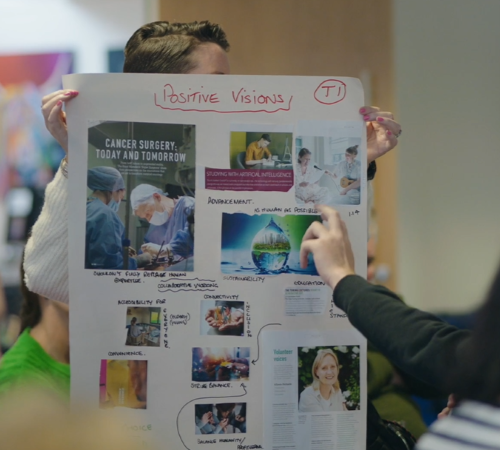
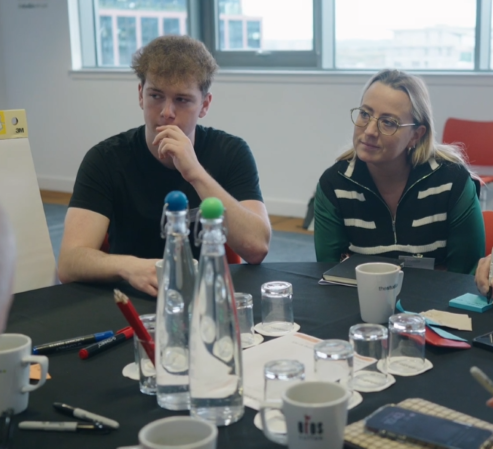
Open discussion and reflections
For our final facilitated discussion, participants chose to explore three distinct topics in smaller groups, changing groups halfway through.
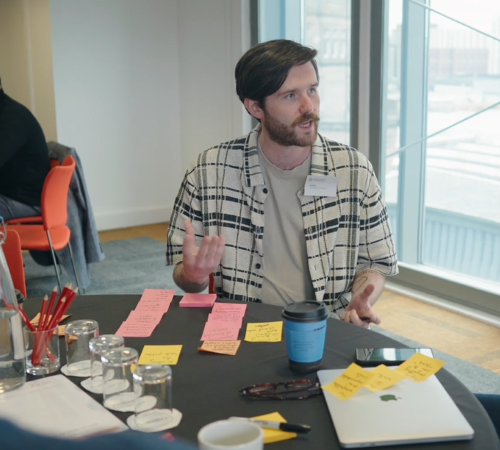
How can local businesses be supported to use AI effectively and responsibly?
Participants felt existing systems like intellectual property laws aren’t enough to ensure local communities benefit from AI. They highlighted that data—the key local asset—is poorly protected once shared.
To secure a return on investment for communities, they suggested new approaches,
perhaps borrowing ideas from community land buyouts, which have successfully
empowered locals to take control of resources. This model could give communities a say in how AI is developed and used, ensuring it delivers tangible benefits. For example, AI could improve roadwork planning, reducing disruptions.

AI and Health Inequality: How could or should we use AI to address and mitigate health
inequalities?
This conversation revealed a consensus that health inequalities are often rooted in broader social disparities. The group emphasised that AI must be part of a larger redesign of healthcare systems rather than a quick-fix addition to existing structures.
One practical suggestion was to make health information available in people’s first
languages by default, ensuring accessibility. Another point was the importance of
intersectional data collected at the community level, ensuring that resources are allocated where they are most needed. In particular, it was highlighted that women’s health has significant data gaps, and AI could help identify these gaps, driving research and improvements in this area.
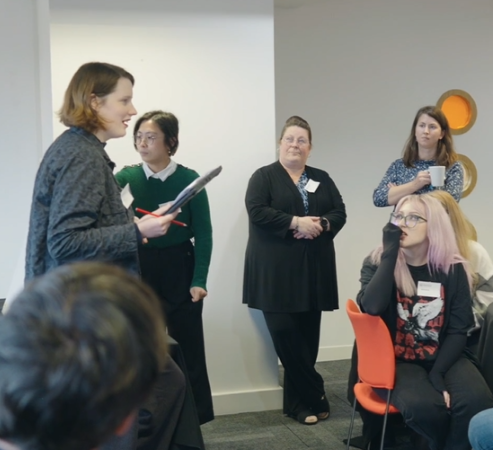
AI and Public Services: How could or should we use AI to improve access to and delivery of public services such as education and skills training?
AI has the potential to make public services more accessible and user-friendly. People
sometimes struggle to navigate outdated websites or find accurate details about local services. AI could change this by presenting information in everyday language and intuitive formats.
For example, AI could connect individuals to community groups, mental health resources, or local initiatives they might not be aware of. It could also act as a career advisor, asking simple but meaningful questions—like what hobbies they enjoy—and helping them explore career paths they might not have considered.
Hear from the public on AI
Members of the public were invited to share their views on a number of questions:
- What brought you to participate in the summit today?
- Do you have any hopes and fears around AI?
- How confident are you that the benefits of AI will be seen locally in Glasgow?
- What would make you trust AI?
- How confident are you in AI?
Explore all the videos in a playlist.
Related policy work
Belfast - People's AI Stewardship Summit
The first People's AI Stewardship Summit was held on 5 March 2024 at the Enterprise Hub NI in Belfast. Members of the…
Futures and Dialogue
Using foresight techniques and engaging with the public and other stakeholders to inform policy and policymakers.
Data and AI
The Academy has undertaken a wide range of projects on the role of data and artificial intelligence (AI) in shaping the…
Engineering Responsible AI
The Academy's Engineering Responsible AI campaign explores how the emerging technology of artificial intelligence (AI)…
